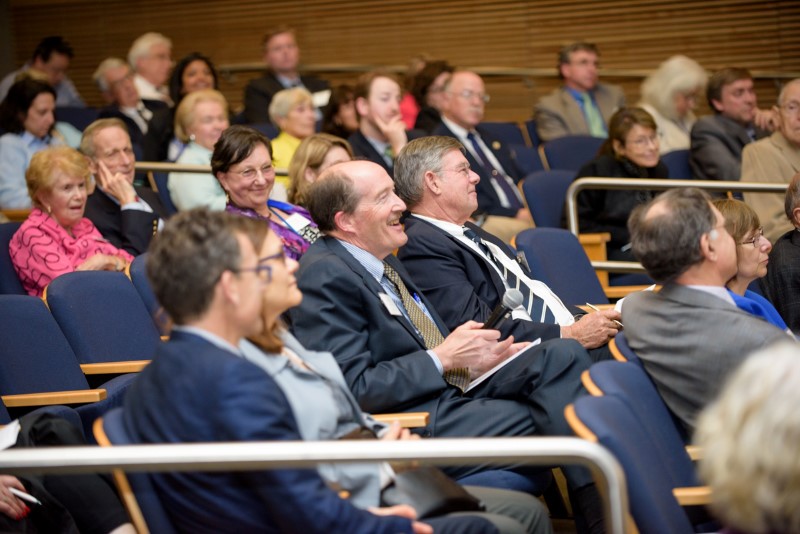2016 Hudson Hoagland Society Annual Meeting focuses on the science of addiction
May 27, 2016
 |
At the 31st Annual Meeting of the Hudson Hoagland Society on May 24, members paid tribute to the group’s distinguished research history and focused on scientific solutions to the thorny contemporary problem of addiction and substance misuse. The HHS, named for the co-founder of the Worcester Foundation for Biomedical Research, is predicated on the understanding that biomedical research would lead scientists—and society—in unexpected directions, and that support for pioneering research was a necessity.
Terence R. Flotte, MD, executive deputy chancellor, provost and dean of the School of Medicine, gave an overview of institutional accomplishments for the past year. He noted the impressive quality of the incoming class of the School of Medicine, which will number 150, including, for the first time, 25 out-of-state students. He also summarized the process by which UMass Chan Medical School became the first medical school to fully integrate opioid conscious competencies into its curriculum for graduating medical and advanced practice nursing students, driven by a national crisis in opioid misuse and consequent deaths from overdose. Dean Flotte described the rapid timeline that a multidisciplinary team of faculty followed to create the new elements for the curriculum, driven by the urgency of what he called “an epidemic” of deaths from overdose and the challenges substance misuse presents for practicing physicians.
In keeping with the theme of urgency around the opioid misuse crisis, Thoru Pederson, PhD, the Vitold Arnett Professor of Cell Biology, professor of biochemistry & molecular pharmacology and scientific director of the Worcester Foundation for Biomedical Research when it merged with UMass Chan Medical School in 1997, introduced a special interactive panel discussion, “The Science of Addiction: From Biology to Treatment.” Three prominent UMMS faculty scientists studying different aspects of addiction and pain management spoke: Andrew Tapper, PhD, associate professor of psychiatry and interim director of the Brudnick Neuropsychiatric Research Institute; Amy Wachholtz, PhD, assistant professor of psychiatry and director of health psychology at UMass Memorial Medical Center; and Judson Brewer, MD, PhD, associate professor of medicine and psychiatry and director of research in the UMMS Center for Mindfulness.
Tapper discussed new research findings based on brain imaging technology that reveal regions of the brain that appear to be responsible for the withdrawal symptoms experienced in smoking cessation, leading his lab to investigate the circuitry in the brain that plays a role in addiction-related behaviors.
Wachholtz talked about how opioid treatment for pain can alter pain response over time, and referenced new approaches to the assessment and management of chronic pain.
Brewer’s work applies the techniques of mindfulness training to areas such as smoking cessation, including the use of new technologies as a key tool in breaking addiction behaviors. After brief presentations, the three faculty engaged in a spirited question and answer session with members of the society.
Dr. Pederson also announced the 2016 recipients of Worcester Foundation Research Grants, which are supported by gifts to the Hudson Hoagland Society.
Award recipients
- J. Kevin Donahue, MD, professor of medicine (Bassick Family Foundation Award Recipient)
Identification of the mechanism for ventricular tachycardia in hearts with healed myocardial infarction scars - Thomas Fazzio, PhD, associate professor of molecular, cell & cancer biology
Regulation of enhancer RNAs in embryonic stem cells - Dannel McCollum, PhD, professor of biochemistry & molecular pharmacology
Modeling LATS 1/2 inhibitors as treatments to stimulate regeneration of the heart and other tissues - Peter Newburger, MD, professor of pediatrics and molecular, cell & cancer biology
Deadly disease from an intracellular traffic jam - Dorothy Schafer, PhD, assistant professor of neurobiology
How do immune cells wire the brain - Carol Schrader, PhD, research assistant professor of microbiology & physiological systems
AP 1 endonuclease expression levels regulate somatic hypermutation and lymphocyte selection

